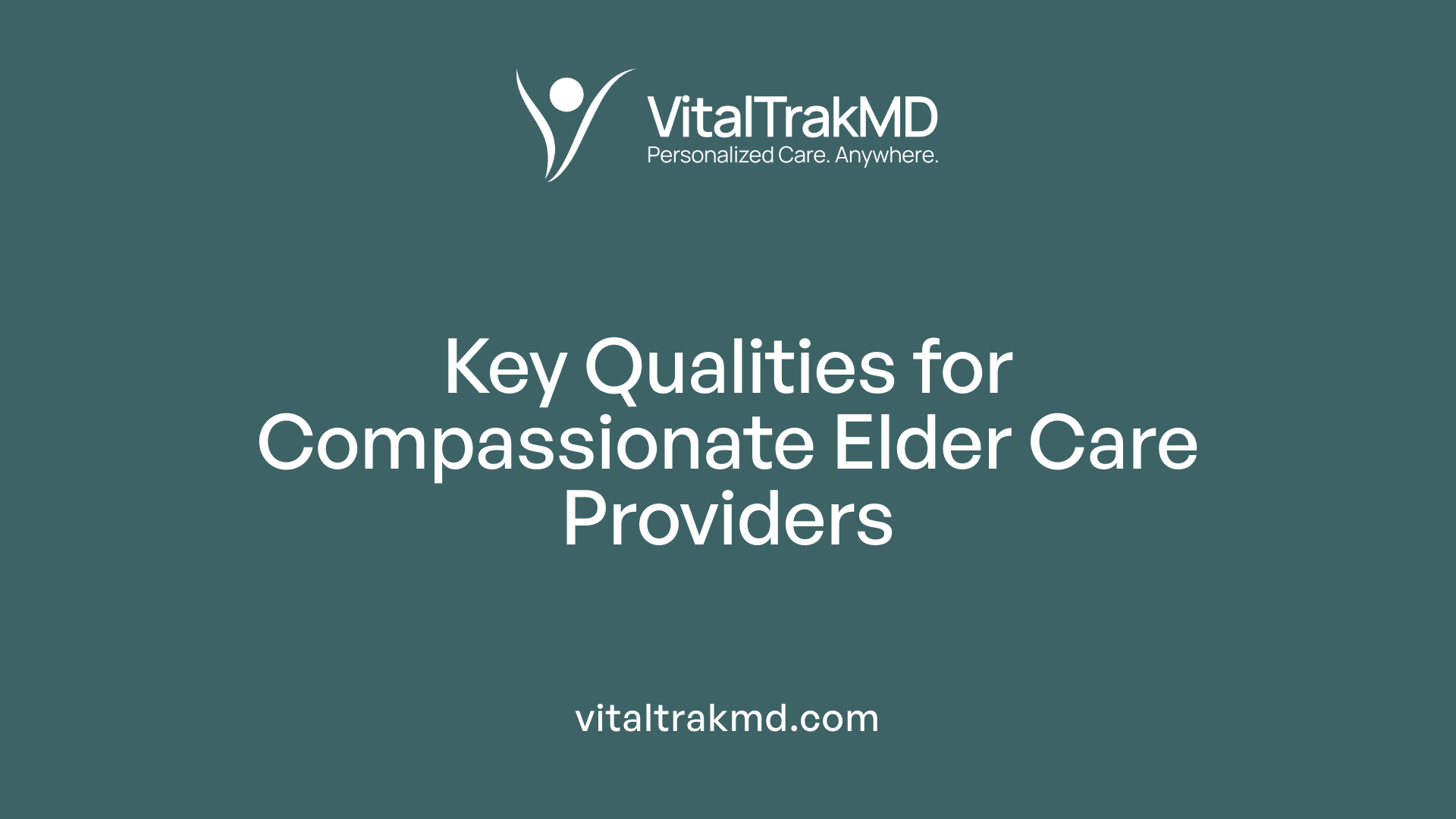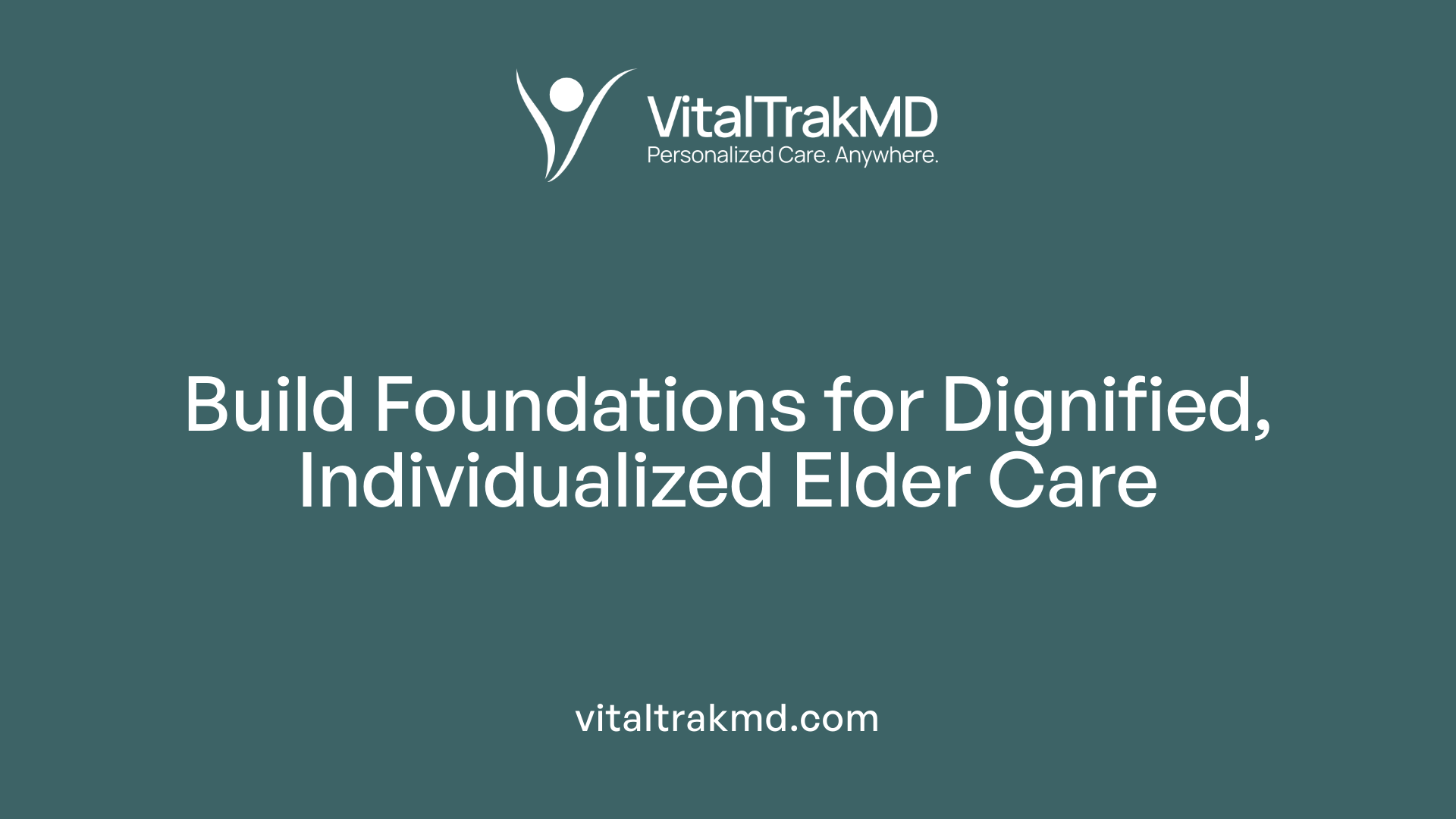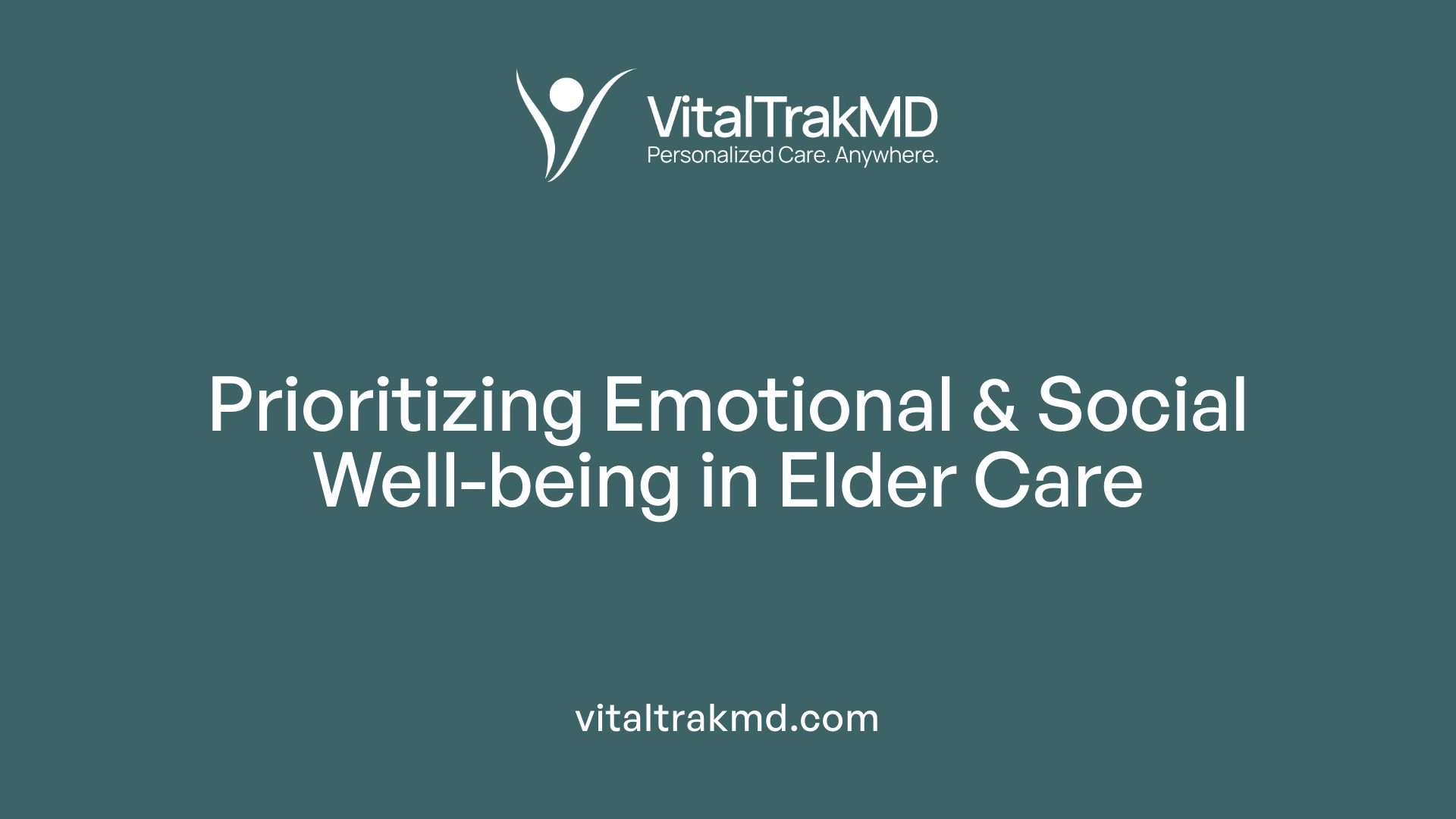What Makes a Health Program Truly Personalized for Older Adults

Understanding the Core of Truly Personalized Care for Seniors
As the aging population continues to grow, so does the need for health programs that truly cater to the unique needs of older adults. Personalized elder care goes beyond standard protocols to embrace a comprehensive, individual-centered approach. This article explores what makes a health program genuinely personalized for seniors, highlighting essential qualities for healthcare providers, key components of tailored plans, innovative strategies, and future trends that promise to enhance the quality of life for older adults.
Qualities Essential for Providers of Elderly Care
 Healthcare providers dedicated to caring for older adults must demonstrate a range of qualities to ensure compassionate, effective, and respectful service. Central among these are empathy and patience, allowing providers to connect deeply with seniors’ experiences and respond calmly to the challenges of aging.
Healthcare providers dedicated to caring for older adults must demonstrate a range of qualities to ensure compassionate, effective, and respectful service. Central among these are empathy and patience, allowing providers to connect deeply with seniors’ experiences and respond calmly to the challenges of aging.
Specialized training in geriatrics is vital. It equips providers with the knowledge of age-related health concerns, enabling them to tailor treatments and preventive strategies appropriately. Understanding the complexities of chronic illnesses common among seniors, such as dementia, arthritis, or heart disease, helps in managing these conditions effectively.
Strong communication skills are also crucial. Good communication fosters trust and helps seniors understand their health conditions and care options. Providers should be adept at explaining complex medical information simply and in ways that resonate with the personal and cultural backgrounds of their patients.
Team-based collaboration enhances the comprehensiveness of elder care. Effective teamwork involving nurses, doctors, therapists, and social workers ensures all aspects of an older adult's physical, emotional, and social needs are addressed holistically.
Accessibility and adaptability in care delivery are key features of high-quality care. This includes offering flexible appointment scheduling, telemedicine options, and services that accommodate mobility or sensory limitations. Such approaches help seniors access and benefit from continuous, personalized care.
In summary, the best caregivers for older adults bring empathy, intensive specialized training, clear communication, collaborative spirit, and flexible, accessible services. These qualities ensure that seniors maintain their dignity, independence, and well-being, fostering a trusting and supportive care environment.
| Quality | Description | Impact |
|---|---|---|
| Empathy & Patience | Ability to understand seniors' feelings and respond calmly to their needs | Builds trust, eases anxiety, improves cooperation |
| Gerontology Training | Specialized education on aging-related health issues | Ensures effective, personalized health interventions |
| Communication Skills | Clear, simple explanations and active listening | Enhances understanding, decision-making, satisfaction |
| Team Collaboration | Working well with multidisciplinary teams to coordinate care | Provides comprehensive and consistent support |
| Accessibility & Flexibility | Convenient scheduling, telehealth, adaptable services | Ensures ongoing access to essential care and support |
For further insights, searching
Personalized Care Plans: Foundations and Development

What is a personalized health plan for older adults?
A personalized health plan for older adults is a tailored approach that considers each individual’s medical history, emotional well-being, daily routines, and personal preferences. These plans are created collaboratively by healthcare professionals, family members, and the seniors themselves to ensure every aspect of their care aligns with their unique needs and life goals.
A well-designed plan includes managing medications, monitoring chronic health conditions like diabetes or hypertension, and implementing safety strategies at home to prevent falls and injuries. Emotional support, social engagement activities, and spiritual considerations are also integrated to promote overall well-being.
Crucially, these plans are not static; they are adaptable and evolve as the senior’s health or circumstances change. Regular assessments allow updates that reflect new health challenges or personal preferences. This flexibility helps maintain independence, protect dignity, and improve the quality of life for older adults.
How do comprehensive health assessments influence personalized care?
Holistic assessments are fundamental to developing effective care plans. These evaluations gather information on physical health, cognitive function, emotional state, social connections, and cultural background. Understanding all facets of a senior’s life enables the creation of a comprehensive, individualized plan that addresses specific needs.
Assessments include medical history reviews, evaluations of mobility challenges, safety considerations, and inquiries into personal routines and interests. This thorough understanding helps tailor interventions—such as exercise routines, dietary plans, or social activities—that resonate with the senior’s preferences and cultural values.
What role does family and caregiver involvement play?
Family members and caregivers are vital allies in crafting and executing personalized care plans. Their involvement ensures that the care reflects the older adult’s preferences and provides emotional support.
Family participation facilitates shared decision-making and enhances communication with healthcare professionals. It also helps in monitoring ongoing health status and making necessary adjustments to the care plan. Including family insights and values ensures a more holistic, compassionate approach that respects the senior's life history and personal choices.
How do personalized plans stay responsive and adaptable?
Personalized care plans are inherently dynamic. Regular evaluations and health assessments are scheduled to track the senior’s progress or detect new issues early. As health conditions improve or deteriorate, the care plan is updated accordingly.
This adaptability allows for adjustments in daily routines, safety measures, social activities, and medical treatments, ensuring the plan remains relevant and effective. Moreover, changing personal preferences—such as desires to engage in new hobbies or modify living arrangements—are incorporated promptly, supporting ongoing independence and dignity.
What are the goals of fostering independence and dignity?
Fostering independence and dignity is at the core of personalized elder care. By actively involving seniors in decision-making and respecting their choices, care plans aim to empower them to maintain control over their lives.
Activities are tailored to promote physical activity, social interaction, and participation in daily routines that the seniors find meaningful. Safety strategies are designed not just to protect but to support autonomy.
This approach helps seniors preserve a sense of self-worth, uphold their personal identity, and enjoy a higher quality of life, even as health challenges arise. Ultimately, personalized plans enable older adults to age in place with dignity and respect, surrounded by care that recognizes and celebrates their individuality.
Strategies for Developing Effective, Adaptive Personalization

How can treatment plans be customized for older adults based on their age, lifestyle, and severity of conditions?
Creating personalized care plans for seniors involves considering various aspects of their lives, including age, health status, lifestyle, and specific health conditions. Tailoring these plans effectively requires a comprehensive understanding of each individual’s unique circumstances.
First, healthcare providers conduct thorough assessments that include physical health, emotional well-being, social connections, and personal interests. These evaluations help identify what activities or treatments are suitable, safe, and meaningful for the individual.
Adjustments are made based on health progression or regression. For example, if a senior's mobility declines, routines and support strategies are modified to maintain independence and safety. Conversely, health improvements may lead to increased activity levels or different therapeutic approaches.
Involving residents and their families in decision-making is crucial. Their insight into daily routines, cultural background, personal preferences, and spiritual values ensures care plans respect individual dignity and autonomy.
Technological tools play an increasingly vital role. Wearable devices, telemedicine, and electronic health records enable precise data collection, facilitating tailored interventions. They help monitor health status in real-time, allowing for early adjustments in care when needed.
Despite the benefits, barriers such as limited access, privacy concerns, and costs must be addressed. Solutions include expanding telehealth services, ensuring data security, and advocating for insurance coverage of personalized therapies.
By continuously reviewing and updating care plans, healthcare teams can respond to changing needs. This flexibility ensures that each older adult receives the most appropriate, effective, and respectful care tailored to their evolving life circumstances.
In sum, customizing treatment plans involves a blend of comprehensive assessments, active participation of seniors and their families, smart use of technology, and responsive adjustments. When done well, it significantly enhances health outcomes, promotes independence, and preserves dignity for older adults.
The Role of Emotional and Social Well-being in Personalization

What is a personalized health plan for older adults?
A personalized health plan for older adults is a tailored approach to care that considers each person's unique medical history, emotional state, daily routines, cultural background, and personal interests. Unlike generic care models, these plans are created collaboratively by healthcare providers, family members, and the seniors themselves, ensuring that care reflects individual preferences and life circumstances.
These plans address not only physical health, such as managing chronic conditions like diabetes or arthritis, but also emotional and social needs. They include strategies for medication management, safety measures at home to prevent falls, and psychological support, like counseling or cognitive exercises.
A significant focus of personalized health plans is fostering social engagement. This may involve arranging social activities such as music, art, or group exercises that promote mental stimulation and emotional well-being. The overarching goal is to boost independence, dignity, and happiness while adapting to the evolving health and social needs of the senior.
Addressing loneliness and social isolation
Loneliness and social isolation can significantly impact seniors’ health, increasing risks of depression, cognitive decline, and physical health problems. Personalized care explicitly aims to combat these issues by integrating social elements into daily routines.
Care plans often include opportunities for regular social interaction through community programs, social clubs, or visits from friends and family. Virtual engagement tools are also increasingly used to connect seniors with loved ones when physical visits are limited.
Incorporating social support networks
Social support networks play a critical role in a senior’s overall well-being. Personalized care involves mapping out existing support systems, including family, friends, neighbors, and community resources.
Healthcare teams work with families to facilitate communication and shared decision-making, ensuring that support is responsive and relevant. Building strong networks helps older adults feel valued and less isolated, which boosts mental health and fosters a sense of belonging.
Engagement activities like art, music, and exercise
Participation in activities such as painting, playing musical instruments, gardening, or gentle exercise can enrich seniors' lives. These activities are customized based on individual interests and physical abilities.
Engagement promotes cognitive resilience, physical mobility, and emotional satisfaction. Care plans often include scheduled activities that align with personal preferences, encouraging ongoing participation and social interaction.
Family involvement and shared decision-making
Family members are integral to personalized elder care. Their involvement ensures that care aligns with the senior's values and desires.
Through shared decision-making, families and seniors discuss goals, preferences, and concerns openly. This collaborative process helps develop care strategies that respect the individual’s dignity and autonomy.
Creating a sense of community and belonging
Finally, fostering an environment of community and belonging is vital. Care settings and programs that promote participation in group activities, social events, and local community engagement help seniors feel connected.
A strong sense of community contributes to emotional resilience, reduces feelings of loneliness, and improves overall quality of life.
| Aspect | Focus | Benefits | Additional Notes |
|---|---|---|---|
| Emotional well-being | Combating loneliness, providing companionship | Improved mood, reduced depression | Involves regular social visits, counseling |
| Social support | Networks, family, community involvement | Greater sense of belonging, safety | Includes support for family involvement |
| Engagement activities | Art, music, exercise | Cognitive and physical health benefits | Tailored to individual interests |
| Family involvement | Shared decision-making | Respect for preferences, Dignity | Ongoing communication and planning |
| Sense of community | Social groups, community events | Emotional resilience, social cohesion | Facilitates participation and volunteer roles |
Personalized approaches emphasizing emotional and social well-being are essential in elder care. They support the overall health, happiness, and independence of seniors, helping them lead fulfilling lives.
Innovations and Future Directions in Personalized Elder Care

How can treatment plans be customized for older adults based on their age, lifestyle, and severity of conditions?
Creating personalized treatment plans for seniors involves a comprehensive approach that considers multiple aspects of their lives. Age, health status, and severity of conditions like diabetes or arthritis are tailored alongside their daily routines, cultural background, and mental health. This ensures that care is relevant and respectful of each senior’s unique situation.
Modern technology plays a vital role in this process. Wearable sensors track vital signs and activity levels, providing real-time data to healthcare providers. Telemedicine offers convenient access to medical consultations without the need for travel, especially useful for those with mobility challenges.
Electronic health records (EHRs) compile extensive medical history, helping clinicians make informed decisions tailored to the individual's specific health profile. Artificial intelligence (AI) analyses this data to identify patterns and suggest personalized interventions.
Active engagement of seniors in their care discussions is crucial. Clear communication about their preferences, goals, and cultural values ensures treatment respects their dignity and autonomy. Addressing barriers such as limited access, high costs, and concerns over data privacy remains essential to equitable care.
As technology advances and these barriers decrease, treatment plans will become increasingly precise, accessible, and aligned with individual circumstances. This evolution supports better health outcomes and enhances quality of life for older adults.
| Technology | Role | Benefits | Challenges |
|---|---|---|---|
| Wearable sensors | Collect health and activity data | Real-time monitoring, early detection of issues | Privacy, cost |
| Telemedicine | Remote consultations | Accessibility, convenience | Technology literacy, internet access |
| AI and data analytics | Analyze health data to personalize care | More accurate, predictive interventions | Data privacy, algorithm bias |
| Electronic Health Records (EHRs) | Centralize medical information | Better coordination, comprehensive view | Data security, interoperability |
Looking ahead, the integration of these innovations promises a future where elder care is more responsive, personalized, and respectful of each person’s unique life journey.
Embracing Personalization for a Better Aging Experience
The shift towards genuinely personalized health programs for older adults signifies a commitment to evaluating individual needs, preferences, and life circumstances. This approach not only enhances physical health but also preserves dignity, supports mental and emotional well-being, and fosters social engagement. As healthcare advances and innovative technologies evolve, the future of elder care promises more precise, accessible, and respectful treatment options. Combining comprehensive assessments, collaborative planning, technological integration, and family involvement ensures that each older adult's aging journey is met with compassion, respect, and tailored support — truly making a health program personalized.
References
- Personalizing Care Plans for Seniors: Why One Size Doesn't Fit All
- Understanding Personalized Senior Care
- Why Personalized Elderly Care is Must in Long-Term Health?
- [PDF] “What Matters” to Older Adults? - Institute for Healthcare Improvement
- Community health promotion programs for older adults: What helps ...
- Benefits of Personalized Care Plans in Nursing Homes - Haven Health
- Your Voice, Your Choice: How Older Adults Can Take the Lead in ...
- How Personalized Care Plans Improve the Resident Experience
- Personalised care planning for adults with chronic or long‐term ...
- Personalized Care May Improve Outcomes for Elderly Patients
Recent articles
Want to Feel Better and Live Healthier?
Join hundreds of patients taking control of their health with personalized care that fits their life – not the other way around.
Rated 4.8/5 by 32+ customers







